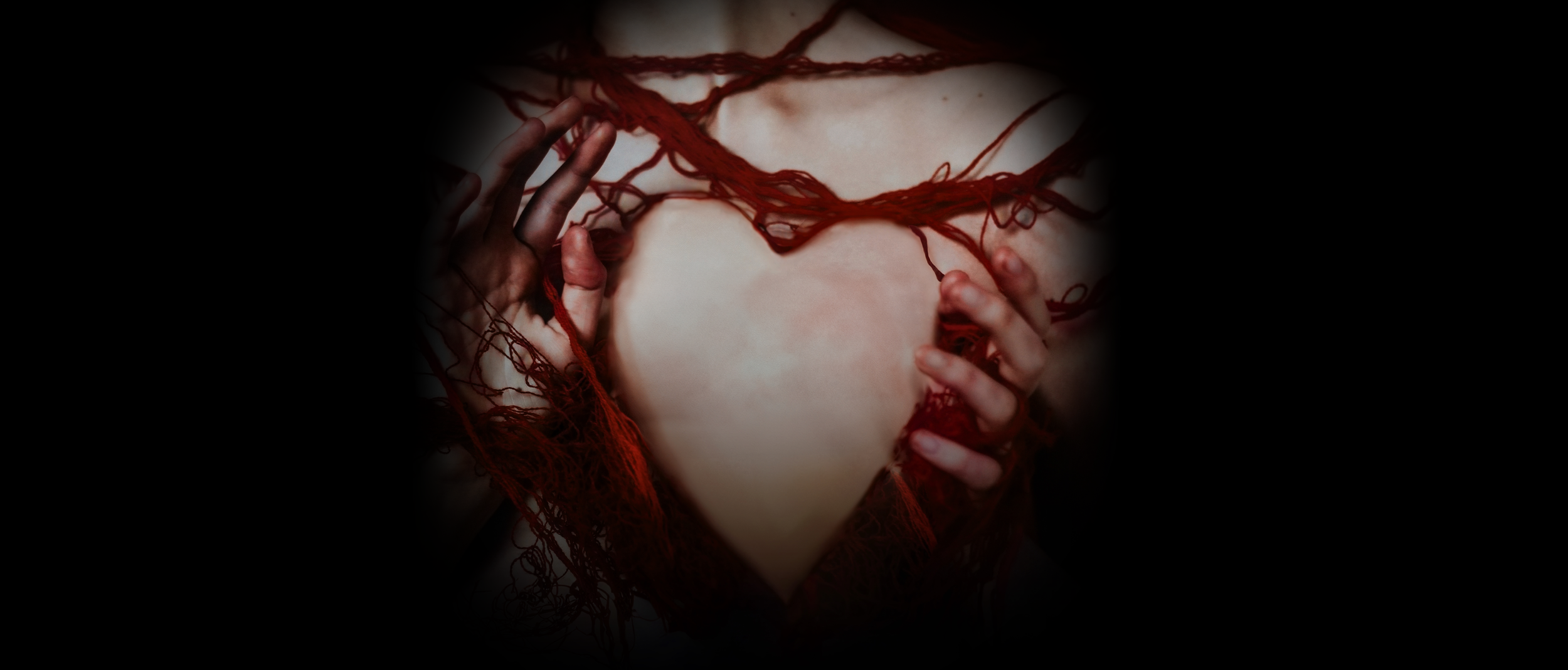

Devised in collaboration with IARTS and Theatre and Film Studies students
NOVEMBER 8 - 17
The opening words of the show are adapted directly from the prologue to Ovid’s poem, Metamorphoses, and provide the central metaphor for the play. Songs, poems, and stories are a form of weaving. Storytellers weave tapestries in time, pictures of the world that influence the way we understand ourselves and each other.
The ancient stories of classical mythology have moved through time and still circulate in our society today. They come from a world far away and were brought to these lands through colonization. What values do they hold? What do they tell us about love?
Within colonial culture, classical stories have been idolized and treated as if they hold a key to the essential nature of humanity. Our production presents them in a critical light. The characters, the imagery, and the language of Ovid’s work have a powerful, evocative charm, but the patterns of love and romance depicted are far from idyllic. The couplings that emerge are, in the vast majority of cases, non-consensual: rapes couched in poetic language and beautiful images of transformation.
Ovid’s poem was controversial in his times, and it remains so in ours, although for different reasons. It offers a hierarchal and patriarchal worldview in which humans must honour and obey the gods and accept they are subject to the divine power of love and desire - power that cannot be resisted by anyone, but especially by men. Reading them today felt at times like we were uncovering the roots of rape culture.
Woven Hearts challenges the worldview of Ovid’s poem. The creative team have applied their own perspectives on love, power, and consent, to tell selected stories from Ovid’s poem in new forms, new patterns. The play also stages some of the process of our engagement with the material. The early stories confront the audience with the harms present in the original stories, but slowly the Weavers, the leaders of our storytelling, take control, unpick the old stories and weave new patterns, new versions of the stories that depict loving relationships founded on mutuality, consent, and forgiveness. Love has the power to connect, to bring us together, to enrich and transform our lives.
In the process of sifting and unpicking Ovid’s work, we found stories we felt were beautiful in their own right, and were drawn to elements of his poem that have been hidden, marginalized by colonial cultures that have long seen only two genders, and valued only heterosexuality. We have foregrounded those Queer and trans moments and stories, and our writing and casting embraces the diversity and variety of loves we know from our lives.
The devising team also valued love as an idea that extends beyond romance, approaching the subject within the complex contexts of family, brothers, mothers, daughters. In this exploration, we sought out classical sources beyond the scope of Ovid’s poem: our play includes the story of Prometheus, Hades and Persephone, and Cupid and Psyche.
Devised theatre relies on intense collaboration. The project started in May with an idea and empty stage and under the care of many creative minds and hearts has grown into the show you will see tonight. I never tire of shaping these shows with the students of McMaster. It is a real privilege to work in this way and I am extremely grateful to every person who has contributed to this project.
Peter Cockett
Director’s Notes
Ovid (43 BCE - c.17 CE), whose full name was Publius Ovidius Naso, is known for his wit, elegance and charm. Having abandoned a political career for a life of poetry within the fashionable circles and literary haunts of Augustan Rome, Ovid found immediate success with his love poetry. He was a prolific writer, a poet who experimented with different kinds of poetry that feature love and desire. He is best known for his Metamorphoses, a mythological epic poem which, as its title suggests, is about transformations, including the transformation of bodies, literary ideas and inherited stories, told and retold by internal narrators as variations of each other. It is at once a catalogue of mythology, an erudite examination of literary conventions and literary memory, and an exploration of many aspects of love and desire. It is a poem about many things: art, nature, gods and humans, love, sexuality, gender, power, sexual violence, creation, destruction, politics, and ethics. There are many stories told within stories, in layered narratives, by different narrators. Ovid’s weaving and reweaving of his own and inherited tales invites admiration but also encourages his readers to adopt a critical attitude towards some of the material. His poem also invites us today to think about it from the perspective of our own present time.
In 8 CE, at the pinnacle of his success, and when the Metamorphoses was all but complete, Ovid tells us he was exiled to Tomis (modern-day Romania) at the farthest reaches of the empire for “a poem and an error.” The reasons are still shrouded in mystery today. Ovid tells us there was a charge of immorality against his poetry for not respecting Augustus’ new programs of reform, which covered adultery (punishable by law), marriage, and family. What the “error” was remains unknown. Although expelled from the limelight and separated from Rome, where his poetic excellence had been applauded so ardently, he continued to write from Tomis. In one of his poems he envisaged his epitaph: “Here I lie, Naso the poet. I who played amid tender loves was slain by my own talent.” He died in Tomis around 17 CE.
Dr. Mariapia Pietropaolo
Department of Greek and Roman Studies
McMaster University
Notes on Ovid
CAST
The cast are all volunteers in this project. The production team and the School of the Arts are deeply grateful for their work and commitment.
ENSEMBLE CAST
These contribute action, character, dialogue, sounds and movement throughout the show in addition to the specific roles noted below (in the order their characters appear in the show):
Prometheus and Ceyx: Vikaash Arunmozhi (he/him), Integrated Arts
Daphne, Hades and Narrator (Iphis and Ianthe): Chris Yanes (any), Integrated Arts
Callisto and Ianthe: Maia Nguyen (she/they), Integrated Arts
Apollo, Ligdus, and Narrator (Persephone and Hades): Jacob Byck (he/him), Theatre & Film Studies
Cassandra and Demeter: Florencia Emulo (she/her), Theatre & Film Studies
Hera and Eleanna: Elodie Lapointe (she/they), Integrated Arts and English/Cultural Studies
Echo, Daedalion, and Narrator (Psyche and Cupid): Pariwash Sundrani (she/they), Integrated Arts and Sociology
Narcissus and Iphis: Mikey Gough (he/they), Theatre & Film Studies
Young Man and Narrator (Alcyone and Ceyx): Jovan Deol (he/him), iArts and Media Arts
Alcyone: Tashi Simms (she/her), Social Sciences
Hercules and Narrator (Prometheus): Julian Grittani (he/him), Integrated Arts
Telethusa and Narrator (Daphne and Apollo): Geri X (she/her), Humanities
Psyche and Narrator (Echo and Narcissus): Kiyang Wajo (she/they), Political Science and Theatre & Film Studies
Persephone and Medusa: Abbey Hanson (she/her), Theatre and Film Studies and English/Cultural Studies
THE WEAVERS
Weaver 1: Maia Venturelli Golba (she/her), Integrated Arts
Weaver 2: Priya Kalsi (she/her), Level I Humanities
Weaver 3: Charlotte Heron (she/her), Integrated Arts
TWO GODS
Cupid: Bex Roitman (they/them), Integrated Arts
Aphrodite: Enoyo Ebhonu (she/her), Political Science
PRODUCTION TEAM
Director and Writer
Peter Cockett (he/him)
The production team below are students in iARTS 3MP6 Major Production Workshop
Stage Management
Amelia Doty (she/her), Integrated Arts
Yasith Weerasignhe (he/him), Theatre & Film Studies and Media Arts
Mikael Carino (they/them), Theatre & Film Studies and English/Cultural Studies
Emma Tier (she/her), Theatre & Film Studies and English/Cultural Studies
Script Supervisor
Emma Tier (she/her), Theatre & Film Studies and English/Cultural Studies
Assistant Directors
Mikael Carino (they/them), Theatre & Film Studies and English/Cultural Studies
Amelia Doty (she/her), Integrated Arts
Yasith Weerasignhe (he/him), Theatre & Film Studies and Media Arts
Choreography
Megan Kolomeir (they/them), Integrated Arts
Sound Design and Music Composition:
Jacob Byck (he/him), Theatre & Film Studies
Tommy Ji (he/him), Theatre & Film Studies
Tram Nguyen (she/her), Media Arts
Pariwash Sundrani (she/they), Integrated Arts and Sociology
Costume/Makeup Design
Chelsea Chai (she/her), Theatre & Film Studies
Florencia Emulo (she/her), Theatre & Film Studies
Rebecca Han (she/her), Studio Art
Paryse Reed (she/they), Studio Art
Alex Qi (he/her), Theatre & Film Studies
Talia Yu (she/her), Theatre & Film Studies
Kevin Zhang (he/him), Theatre & Film Studies
Lighting Design
Luke Mackey-Klaasen (he/him), Media Arts and Theatre & Film Studies
Ruth Moon Lopez (she/her), Communication Studies and Media Arts
Set Design
The loom was designed by Liyu Liu in the summer inspired by the work of Xiaoye Wu in the spring. Fabric installation and action fabrics devised and designed by:
Hadia Aziz (she/her), Art History
Rebecca Han (she/her), Studio Art
Dawei Xue (he/him), Theatre & Film Studies
Outreach
Adrian de Jesus (he/him), Environmental Science
Script Development
Emma Tier (she/her), Theatre & Film Studies and English/Cultural Studies
Yasith Weerasinghe (he/him), Theatre & Film Studies and Media Arts
Pariwash Sundrani (she/they), Integrated Arts and Sociology
The devising process for this show began in the Spring class THTRFLM 3PR3 Devising New Plays: Research and Planning. The core ideas, shape, and direction of the production were laid in place by this inventive group of artist collaborators. Much of their work remains in the show and they deserve credit for what you are about to see and hear tonight.
Writing: Mikael Carino, Mikey Gough, Abbey Hanson, Elodie Lapointe, Emma Prestage, Pariwash Sundrani, Kataya Thibodeau , Zoya Qureshi
Acting: Florencia Emulo, Abbey Hanson, Mikey Gough
Set: Liyu Liu, Zekun Cheng, Xiaoye Wu
Lights: Zoya Qureshi
Sound: Tram Nguyen
Costume: Mikey Gough and Paryse Reed
Three students continued to work on the show in the summer in an Applied Humanities course, and further shaped the project in preparation for production the Fall: Kataya Thibodeau and Emma Prestage (Writing), Liyu Liu (Set Design).
Guest Artists
Christina Fox (they/them) - Intimacy Coordinator/ Fight Director
Christina is a non-binary, queer actor and artist based in Tkaronto. While their first passion is acting, Christina has been delighted to work as an Intimacy Coordinator and Fight Director as well. They are a graduate of the National Theatre School of Canada. Christina enjoys being creative in many different ways- including calligraphy, baking, and illustration.
Ranil Sonnadara (he/him) - Consulting Sound Designer
Ranil Sonnadara is an award-winning, UK-trained theatrical sound designer and composer who moved to Canada in 1998 to pursue research in psychoacoustics. In his "spare time" Ranil is the Creative Director of the McMaster Institute for Music and the Mind's LIVELab, Director of McMaster University’s Performance Science Lab, and Head of Sound Design for the Stratford Festival.
Arts Operations, Resources, & Production:
Provides direct support for operational, resourcing, and production needs within the Faculty of Humanities. We provide specialized, technical, and production resources required to support teaching/learning and research activities (e.g. equipment/technology, skills, space, supplies, and people). On this production the unit performed the following roles:
Producer
Patrick Brennan (he/him)
Production Coordinator
Lisa Ziegler (she/her)
Production Manager
Rachel More (she/her)
Technical Directors
James Kendal (he/him)
Kalyna Conrad (she/her)
Instructional Assistant
Kelly Wolf (she/her)
Order of the Show
The show runs for two hours with an intermission.
ACT 1
SCENE ONE: PROMETHEUS AND APHRODITE
SCENE TWO: DAPHNE AND APOLLO
SCENE THREE: WEAVERS and MEDUSA
SCENE FOUR: ECHO AND HERA
SCENE FIVE: NARCISSUS
SCENE SIX: WEAVERS and HERCULES
SCENE SEVEN: CEŸX AND ALCYONE
SCENE EIGHT: WEAVERS on LOVE
SCENE NINE: CUPID AND PSYCHE (PART 1)
SCENE TEN: WEAVERS: TAKE CONTROL
ACT 2
SCENE ELEVEN: DEMETER, PERSEPHONE AND HADES
SCENE TWELVE: WEAVERS on SEASONS
SCENE THIRTEEN: HERCULES AND IPHICLES
SCENE FOURTEEN: CUPID AND PSYCHE (PART 2)
SCENE FIFTEEN: WEAVERS on LIVES FULLY LIVED
SCENE SIXTEEN: IPHIS AND IANTHE
SCENE SEVENTEEN: HERCULES AND PROMETHEUS
Special Thanks
Dr Mariapia Pieteopaulo & Dr. Angela Sheng
Isabella Stavropoulos, Riley Payne, Luciel Zeng, & Charlie Saltzman



